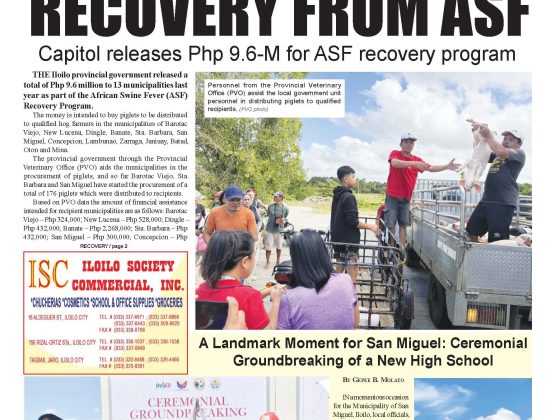First Lady Louise Araneta-Marcos led the groundbreaking ceremony for the construction of a four-story College of Law building at the West Visayas State University (WVSU).
The First Lady is a part-time faculty member at WVSU College of Law where she teaches Criminal Law.
The WVSU, which is the first and only state university in Western Visayas that offers a legal education program in the region, recognizes the need for a separate building.
“At the height of the pandemic when most schools were closing their doors, our university took a leap of faith by opening its juris doctor program. As the only state university offering a legal education program in Western Visayas, we embark on a journey that has surpassed our initial vision,” said WVSU President Dr. Joselito F. Villaruz.
During the ceremony, Villaruz took pride in announcing that the pioneer batch of the program will be taking the Bar examination in September this year.
He also extended gratitude to the First Lady and other stakeholders for “providing the university the opportunity to expand its student intake and widen its legal advocacy programs” through the construction of the state-of-the-art building.
According to DPWH Regional Director Sonny Boy O. Oropel, the College of Law (COL) building is situated within the main campus of WVSU in the La Paz district of this City and will be a green building with a total floor area of 3,456 square meters or 864 square meters per floor.
Facilities to include in the construction are six theater-type air-conditioned classrooms, an auditorium, a review room, a conference room, a legal clinic, a Wi-Fi connection, and a library.
To further enhance the capabilities of the law students, the building will also house two moot courtrooms, an arbitration or training room, and a Journal for Law Advocacy Office which will be used for the simulation of court hearings and litigation processes, among others.
For the instructors, a faculty room and offices for the college dean and associate dean will also be available upon completion of the project.
Apart from these, the COL building will also house a cafeteria, prayer room, storage or supplies room, comfort rooms with persons with disability (PWD) accessible facilities, and a parking area.
To promote the use of sustainable energy, the project also includes solar panels to supply power to the building. Elevators will also be available to allow easy access to all levels of the building for the students, faculty members, and guests.
Security features will also be incorporated including close circuit televisions or CCTV and a key card access system for the entire building.
According to the public works department, the project is targeted to be completed within 458 days after the commencement of its construction. (PIA)


